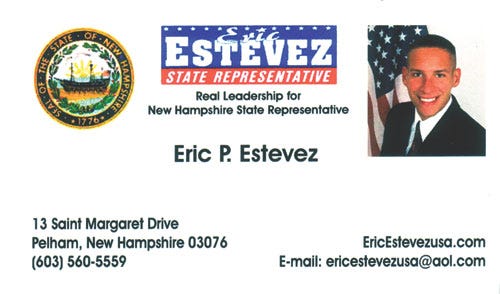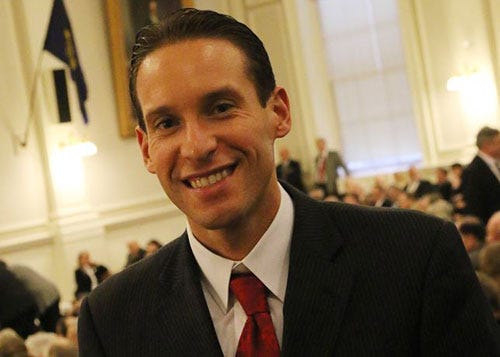A fracas in Concord involving state Rep. Eric Estevez is just the latest incident in a series of controversies that have dogged the Pelham Republican’s political career.
The Hudson~Litchfield News reports Estevez had to be physically separated from Nashua Mayor Donnalee Lozeau after he crashed a luncheon the mayor was hosting in Concord. Estevez reportedly cursed the mayor and became belligerent after she told Estevez and Rep. John Manning (R-Salem) that the lunch was only for Nashua lawmakers.
Rep. Bill Ohm (R-Nashua) told HLN that he separated the two by pulling a pocket door shut between them. A loud crash and more cursing followed as Estevez reportedly slammed a plate down and left. HLN reports House Speaker Shawn Jasper has directed Estevez to apologize in writing to Lozeau and Ohm.
It’s not the first time Estevez has made headlines – not by a long shot.
A politics senior thesis project
Estevez’ first political campaign began just two years after he graduated from Pelham High School when he ran for state representative in 2004. On his campaign website he joked that he was “born to run:”
Eric Paul Estevez was born in Melrose, Massachusetts on June 21, 1983. His parents were Pro Horse Racing Jockeys. His mother rode in races while she was 6 months pregnant with him. Therefore, friends like to joke and say that he was “born to run.” Eric moved to Pelham, New Hampshire with his family when he was 5 years old, and has been a proud citizen ever since.
The Pelham-Windham News reported Estevez missed the filing deadline by four days and had to run as a write-in candidate in the Republican primary. He received 362 votes, well behind the other 14 Republicans vying for one of the 13 spots on the general election ballot. In a letter to the editor written after the election, Estevez congratulated the winners but added cryptically, “Life was unfair in many regards during the campaign.”
Four years later, Estevez claimed his first campaign “was not a real all-out campaign.” He explained to Patch that as a political science major at Barry University in Miami, he needed to complete a senior thesis project. “So I came up with the idea to run for office and get a real hands-on experience of what politics is like,” he said. “I ran for state representative; it was more of an educational endeavor.”
Estevez secured a spot on the Pelham budget committee the next year and then ran for state representative again in 2006. His campaign began with controversy when Estevez was caught passing out business cards that appeared to claim he was a state representative.

Estevez told a Pelham-Windham News reporter that the business card was taken “out of context.” He claimed the phrase, “Real Leadership for New Hampshire State Representative” indicated he was a candidate “for” the office rather than an officeholder. He also said he did not know it is against the law to have the New Hampshire state seal on his business card and promised to remove it immediately.
Estevez lost his second primary bid, placing 14th in the field of 16 with 451 votes.
My heart’s always been in Massachusetts
Four years later, Estevez ran for state representative again – but this time from Massachusetts. “I moved to Massachusetts, where my heart is,” he told Patch. “My heart’s always been in Massachusetts.”
Controversy followed. In short order, Estevez was forced to acknowledge that a photo of Estevez appearing to speak at a rally for Republican gubernatorial candidate Charlie Baker was a fake; retract a press release claiming he had been endorsed by the Massachusetts Italian American Police Officers Association; concede that he was a part-time lecturer rather than professor at Northeastern University; and back down from his claim that he was student body president at Barry University.
“Americans like giving people second chances, politicians especially,” wrote David Rogers. “Even with that being true, Estevez already has burned through his second and third and probably fourth chances to make amends.“
There was more to come. In August, a Wakefield woman called police claiming Estevez ripped an opponent’s bumper sticker off her car. In a letter to the editor of the Wakefield Observer, Nancy Cutter related how Estevez rang her front doorbell and then one on the side of her house:
Obviously, he assumed no one was home because the next thing he did was go to the rear of my car and remove the bumper sticker for David Lucas that was on the rear window. I wondered what he was doing and after he walked down Oak Street and turned on to Meadowview Road I went out to see if he had left a brochure or something under the rear window wiper. You can imagine my surprise and anger when I saw what he had done. I looked for him on Meadowview Road but couldn’t locate him. Then I went home and called the police.
Later in the day, I was speaking to my sister-in-law who is also my neighbor and told her what had happened. She said she had spoken with Eric that afternoon and had his business card and flier he had left. As soon as I saw his photo, I recognized him. I then again spoke with the police and two officers came to my home to discuss the matter.
Estevez responded with a non-denial denial, telling Patch, “That allegation is just ridiculous and I didn’t even respond to it because I think the people of the commonwealth of Massachusetts deserve better than political candidates bickering and engaging in politics as usual.”
Estevez received 398 votes in the primary, well behind winner David Lucas who received 1,551 votes and second place finisher Monica Medeiros with 1,034.
Back to the Granite State
Last year, Estevez ran for state representative once more – this time from New Hampshire again. He won his primary, finishing 11th to claim the last spot on the general election ballot to represent Pelham and Hudson, but the 12th place finisher claimed Estevez had not lived in the district for the previous two years as required.
Jared Stevens of Hudson filed a formal challenge with the state ballot law commission. He submitted documentation indicating Estevez listed a Wakefield, Massachusetts address as his residence on a February 14, 2013 corporate filing with the Commonwealth.
The commission voted 4-1 to deny the challenge. In its report, the commission stated that Estevez “testified under oath that he had returned to New Hampshire in June of 2012, provided evidence of a driver’s license and registration from that time, and stated that he had not resided in the Wakefield residence, no longer rented by him, in the last two years, but had resided in the family residence in Pelham.”
Estevez expressed his gratitude. “Since I was a little kid I have wanted to be a state representative,” he told the Union Leader.



